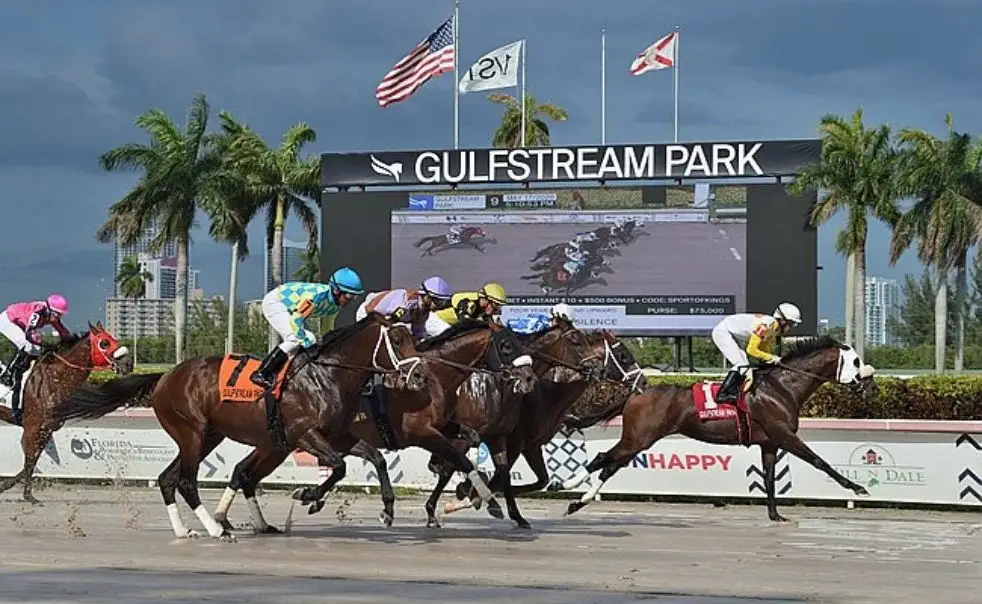Horse Racing at Gulfstream Park May End Amid Legislation

Elle
Jan 22nd 2025
Likes
Share:
Gulfstream Park, which has been an essential part of South Florida’s racing history, is one most likely to face problems for racing in the future due to planned legislative changes. A famous trainer for racehorses, Dale Romans, said he had some worries after participating in a meeting concerning Florida House Bill 105. This bill seeks to separate casino licenses from the requirement of hosting live racing events at thoroughbred tracks.
Gulfstream Park, which started to work in 1939 and subsequently ceased to function until 1944, now must present horse racing to keep the casino working. In case of the approval of the House Bill 105, this prerequisite would not be in force anymore which might mean the end of this sport event at the Park. According to Romans, the bill could allow Gulfstream to operate its casino without live racing after a three-year transition period.
“The horsemen and the racetrack have always worked together,” Romans explained. “We share revenue from the casino for racing purses, but now they’re looking to change that. They’ve promised a subsidy for three years, but that’s a very short time.”
Currently, Florida has two thoroughbred racing tracks: Gulfstream Park and Tampa Bay Downs. Gulfstream’s casino operations tie directly to its live racing events, making it the only facility affected by the bill. Tampa Bay Downs, which lacks a casino, would remain unaffected.
Removing the live racing requirement could significantly alter the economic structure of Gulfstream Park. With its property reportedly valued at over $1 billion, some fear it could be sold for redevelopment. Previous legislative actions have already reduced live racing in South Florida, leaving Gulfstream as one of the few remaining venues for the sport.
Horse racing at Gulfstream Park is not just a sporting event it supports jobs, tourism in Florida, and local businesses. Romans and other stakeholders worry about the loss of these benefits if racing ends.
“This place is a part of history,” Romans said. “It’s more than a racetrack; it’s a community centerpiece. Losing it would impact many lives.”
The closure of Gulfstream Park would affect not only trainers and jockeys but also countless employees in supporting industries, from hospitality to maintenance.
Hills of Locust Street to obtain a statement from Gulfstream Park concerning the possible effects of HB 105 proved to be unsuccessful as of yet. Furthermore, Local 10 News recently contacted Florida State Representative Adam Anderson R- Tarpon Springs, the bill’s supplier, but was not provided with a response.
Meanwhile, stakeholders in the horse racing partnership community continue to voice their concerns. They argue that the decoupling measure could dismantle the existing horse racing partnership between casino operators and horsemen, leaving the sport without a stable financial foundation. The outcome of House Bill 105 will determine whether Gulfstream Park retains its role as a major racing venue, which is crucial for tourism in Florida. For now, those who value the park’s history and economic contributions are urging lawmakers to carefully consider the broader implications of the proposed changes on tourism in Florida.
The preservation of Gulfstream Park could help sustain tourism in Florida, driving visitors and supporting the local economy. With its prominence in tourism in Florida, the park plays a vital role in attracting tourists and bolstering tourism in Florida. This decision could impact not only the racing community but also tourism in Florida, which relies on such iconic venues.
The proposed legislation threatens to remove the live racing requirement for casino licenses tied to horse tracks, placing Gulfstream Park’s future in jeopardy. Without live racing, the park could face closure, impacting jobs, tourism in Florida, and the local economy. Gulfstream’s land, reportedly worth over $1 billion, might be repurposed for other uses. Horsemen and other stakeholders are actively advocating to preserve this historic venue and its racing heritage. As discussions around HB 105 continue, the fate of Gulfstream Park hangs in the balance, with significant implications for South Florida’s horse racing partnership tradition and economy.
